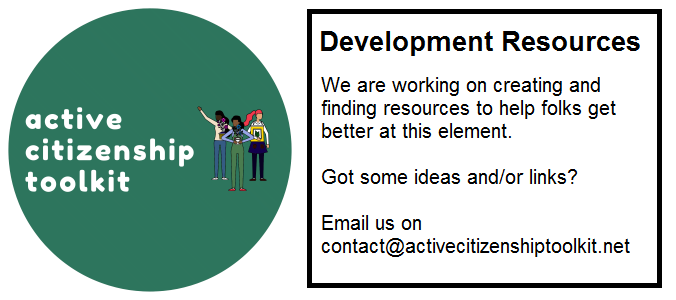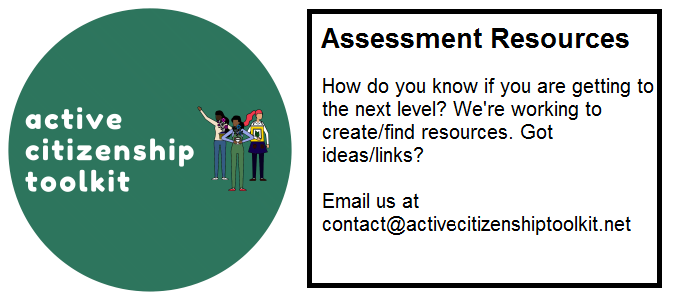Element Descriptor
There’s much more to a decent film showing than advertising it and then hitting play. You want to spark discussion, create the possibilities of real connection. Doing it badly makes it harder to movement-build, rather than easier. #owngoals
Level descriptors
| Novice | Practitioner | Expert | Ninja |
|---|---|---|---|
| You can, with plenty of warning and some support, design and execute a film showing of a relatively short and ‘non-controversial’ documentary, with a functional Q and A/mingling session attached | You can, with little advance notice, design and execute a viable format for a ‘controversial ‘ film documentary where there will be plenty of axe-grinders and confused folks, so that good things come out of the event | You can, spontaneously, design and facilitate a film showing in suboptimal venues which proves to be invigorating, connective and generally inspiring, despite all the landmines (5Gers etc) lying around for people to step on. And you do it with good humour and zero visible stress. | You can design and execute a sequence of film showing, where the plan is additive but people can still feel involved at any stage, where very tricky discussions are aired, and nobody loses the will to live – in fact come away fired up for doing local stuff. |
Element Overview Essay
This is a draft. If something doesn’t make sense, or you see typos, or if you have further ideas, please email us on contact@activecitizenshiptoolkit.net
The reason that film screenings are usually done badly revolve around the general half-arsedness of groups in making sure they’ve got their venue and their power source and everything else sorted, but also in a misunderstanding of what a film showing can achieve. Because it’s often about information deficit. “If we just show this film, the scales will fall from people’s eyes, they will become dedicated effective activists.”
Or it’s to do with a misunderstanding of how to hold the post-film, Q and A/discussion.
The consequences are that the people who came with strong opinions or the people who just generally have strong opinions will tend to dominate. The first four or five questions will come from the usual suspects, usually middle aged and or middle class, university educated white males, usually but not exclusively. And the conversation can then take an incredibly individualistic, atomistic reformist neoliberal approach that avoids questions around systems, systemic change, civil society, social movements, and sustained political pressure as opposed to the feel good reformist crap.
So the solutions are obviously, to have your shit together in terms of pure play event organising to have watched the film and thought about the issues that will come up to have produced some sort of guide to the film in writing beforehand.
And then to make sure that the QA is designed around groups of people being able to share with each other before coming and displaying their virtual concern or knowledge to a big group.
Now, it’s not clear that face to face film screenings are going to return anytime soon.but the same principles do apply online. So if you’re going to do an online film showing, make sure that those watching or who have watched the film have structured opportunities to discuss among themselves, and then you’re likely to get better conversation.
Development Resources

Assessment Resources

